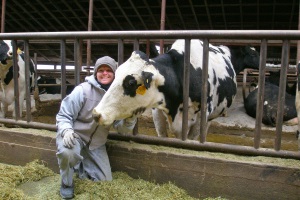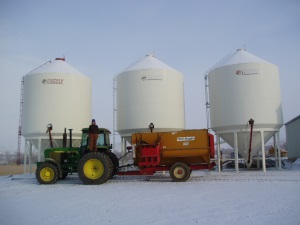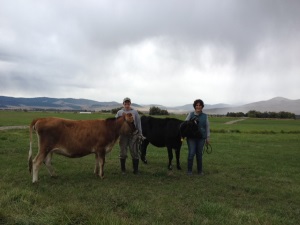By Laura Ginsburg of The Golden Yoke
I remember hearing a stat istic once, that to be an expert at something you had to do that activity for 10,000 hours. Connie and I tried to calculate all of the hours we have stood behind or next to a cow (or under during some unfortunate events), and we still think we are each a long way off from 10,000. While we may not be experts yet, Connie and I have had enough experience to feel strongly that we are capable of managing cows on our own.
istic once, that to be an expert at something you had to do that activity for 10,000 hours. Connie and I tried to calculate all of the hours we have stood behind or next to a cow (or under during some unfortunate events), and we still think we are each a long way off from 10,000. While we may not be experts yet, Connie and I have had enough experience to feel strongly that we are capable of managing cows on our own.
Like we have said in earlier posts, Connie has a degree in dairy science from Virginia Tech. She is pretty sure that she was the one that did not fit in – always asking why dairy had to be done a certain way. Why do cows have to be confined? Why do they have to eat corn? Why are they being bred to be so big? While she had to take genetics, she didn’t really believe that good cows always equals high production…what about health, longevity, personality? Why can’t she show her calf with Virginia Tech’s logo shaved into her side? With her degree in hand, Connie set out to learn how to dairy the way she does best, and that is by doing. She has worked on dairies large and small, confinement and pasture based, Holsteins and Jerseys. When you are a herdsperson for a 4,000-cow dairy, you quickly learn to spot a girl that doesn’t feel well even if you don’t know her personally and on a small farm you really notice because you get to know the cows. On the various farms, Connie has learned to give IV’s, AI, operate all manner of equipment, has pulled numerous calves, stood in knee deep liquid manure to fix broken pumps, and still keeps at it.
My first real cow experienc e was on a cow/calf ranch in Wyoming, where I was thrown into the herd management of several hundred pairs. I knew horses and had incredible desire to learn more about cows, and this was the perfect opportunity. Working on a ranch in a very rural part of the state means you learn to do things quickly and often on your own. I learned how to build fence, irrigate, bale hay, fix the baler, move cows on foot and horseback, vaccinate, drive lots of farm equipment, identify and treat ailments, and how to mix rations. During the winter months I managed a small feedlot with 600 calves and had at least twenty named and tame enough to touch. I learned to milk in Vermont, but my confidence with cows came from my time in Wyoming. While dairy cows are a bit more sensitive than beef cows, they all pretty much want the same things: to be treated well, given good feed, and to have a nice place to lie down.
e was on a cow/calf ranch in Wyoming, where I was thrown into the herd management of several hundred pairs. I knew horses and had incredible desire to learn more about cows, and this was the perfect opportunity. Working on a ranch in a very rural part of the state means you learn to do things quickly and often on your own. I learned how to build fence, irrigate, bale hay, fix the baler, move cows on foot and horseback, vaccinate, drive lots of farm equipment, identify and treat ailments, and how to mix rations. During the winter months I managed a small feedlot with 600 calves and had at least twenty named and tame enough to touch. I learned to milk in Vermont, but my confidence with cows came from my time in Wyoming. While dairy cows are a bit more sensitive than beef cows, they all pretty much want the same things: to be treated well, given good feed, and to have a nice place to lie down.
Connie and I recently met a Ha rvard MBA student who was traveling across country to learn about small entrepreneurs. We met at a festival that celebrates agriculture in Montana, and got to talking about the dairy we are starting. He said that the best thing about Montana is that we just do stuff, that we don’t have people helping us or advising us, we just go out there and get it done. He was really impressed by the hard work people, particularly farmers, put into their daily lives and everything they have to know. That made me feel proud to be a Montanan and to consider myself a farmer. And that is one of the best things about agriculture – you don’t have to know everything to work hard and get stuff done. If you truly want to learn, people are more than happy to offer you an opportunity, even if it means a day getting covered in poop working calves. But you don’t have to be an expert, you just have to be willing to put in the hours to get there. I figure I’ve got at least 6,000 hours left, and there’s enough cows in Montana to make sure I get there.
rvard MBA student who was traveling across country to learn about small entrepreneurs. We met at a festival that celebrates agriculture in Montana, and got to talking about the dairy we are starting. He said that the best thing about Montana is that we just do stuff, that we don’t have people helping us or advising us, we just go out there and get it done. He was really impressed by the hard work people, particularly farmers, put into their daily lives and everything they have to know. That made me feel proud to be a Montanan and to consider myself a farmer. And that is one of the best things about agriculture – you don’t have to know everything to work hard and get stuff done. If you truly want to learn, people are more than happy to offer you an opportunity, even if it means a day getting covered in poop working calves. But you don’t have to be an expert, you just have to be willing to put in the hours to get there. I figure I’ve got at least 6,000 hours left, and there’s enough cows in Montana to make sure I get there.
Until next time, the girls of The Golden Yoke.